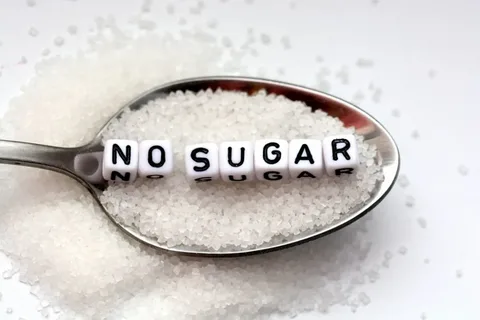
When you think of sugar, your mind probably goes straight to sweet treats like cakes, cookies, and soda. While a little indulgence now and then may feel harmless, research continues to reveal that consuming too much sugar can silently chip away at your health over time. The problem isn’t just the obvious sources—it’s also the hidden sugars lurking in everyday foods, from breakfast cereals to salad dressings. The question many people are asking today is: Is sugar slowly harming your health? The answer is more complicated than a simple yes or no, but the evidence leans heavily toward “yes.”
Table of Contents
The Hidden Perils of Sugar
Sugar in moderation is not inherently dangerous. In fact, your body needs glucose to fuel energy for daily activities. However, the average diet in many countries far exceeds recommended sugar intake. According to the World Health Organization, adults should aim for no more than 25 grams (about 6 teaspoons) of added sugar per day. Yet, many people consume two to three times that amount—often without realizing it.
Excess sugar doesn’t just come from sweets. It hides in processed foods, sauces, flavored yogurts, energy bars, and even seemingly “healthy” smoothies. This hidden sugar quietly builds up in your system, placing strain on your body over time.
How Sugar Affects the Body
Consuming too much sugar creates a ripple effect that can touch nearly every part of your health.
1. Energy Highs and Crashes
Sugar gives you a quick burst of energy, but it’s short-lived. After the initial “sugar high,” your blood sugar levels plummet, leaving you tired, irritable, and craving more sweets. This cycle can make it difficult to maintain steady energy throughout the day.
2. Weight Gain and Obesity
Sugary foods are calorie-dense but nutrient-poor, meaning they provide energy without essential vitamins or minerals. Excess intake often leads to weight gain, particularly around the abdomen. Over time, this can increase the risk of obesity and related health conditions.
3. Diabetes Risk
Constantly bombarding your body with sugar forces your pancreas to release more insulin. Over time, your cells may become resistant to insulin’s effects, which can pave the way to type 2 diabetes.
4. Heart Health Concerns
Research has linked high sugar consumption to increased risk of heart disease. It can raise blood pressure, increase unhealthy fats in the bloodstream, and promote inflammation—all of which strain your cardiovascular system.
5. Dental Problems
Sugar is a major culprit behind tooth decay, as the bacteria in your mouth feed on it and release acids that wear down enamel and create cavities. Left untreated, severe damage can even lead to tooth loss—making restorative options like a tooth implant in Minot, ND, an important solution for regaining your smile.
The Sneaky Sources of Sugar
One reason sugar is so harmful is because it’s easy to underestimate how much you’re consuming. While a slice of cake is an obvious culprit, sugar often hides in everyday foods like:
- Breakfast cereals and granola
- Bottled juices and flavored waters
- Condiments such as ketchup or barbecue sauce
- Packaged snacks and protein bars
- Low-fat or “diet” products, which often replace fat with sugar for flavor
Becoming a label reader is one of the best ways to spot hidden sugars. Look out for ingredients like corn syrup, fructose, dextrose, maltose, and cane juice—they’reall forms of sugar.
Steps to Take Control
Cutting back on sugar doesn’t mean giving up sweetness altogether. It’s about making mindful choices and creating healthier habits. Here are a few steps to consider:
- Start Small: Begin by reducing sugary drinks, one of the largest contributors to added sugar. Swap soda for sparkling water or unsweetened tea.
- Choose Whole Foods: Fresh fruits, vegetables, whole grains, and lean proteins provide natural sweetness and nutrients without excess sugar.
- Cook at Home: Preparing your own meals allows you to control ingredients and avoid hidden sugars in packaged foods.
- Watch Portions: Even healthier treats can add up quickly. Practice moderation rather than cutting out sugar completely, which can feel restrictive.
- Retrain Your Palate: Over time, your taste buds adjust. What once tasted bland will begin to feel naturally sweet.
The Bottom Line
Sugar itself isn’t the villain—it’s the overconsumption of it that’s harming our health. The modern diet makes it all too easy to consume more than we realize, leading to energy crashes, weight gain, and increased risks for chronic diseases. By becoming aware of where sugar hides and making conscious choices to cut back, you can protect your long-term health without feeling deprived.
So, the next time you’re about to reach for that extra cookie or sugary drink, pause for a moment. Ask yourself: Is this small burst of sweetness worth the toll it might take on my health over time? Often, the answer will guide you toward a better choice.
Latest Articles
 Rs 125 Only On TheSpark Shop Batman Styl…In General
Rs 125 Only On TheSpark Shop Batman Styl…In General My Best Hours Report: Productivity Track…In General
My Best Hours Report: Productivity Track…In General Winkelbohrspindel Features That Make Com…In Technology
Winkelbohrspindel Features That Make Com…In Technology APSBCL Retailer Login: Easy Guide For Li…In General
APSBCL Retailer Login: Easy Guide For Li…In General Timewarp TaskUs Login, Setup, And Key Be…In Technology
Timewarp TaskUs Login, Setup, And Key Be…In Technology Kongotech Org Explained: A Hub For Socia…In Technology
Kongotech Org Explained: A Hub For Socia…In Technology When Is Software Qugafaikle5.7.2 Release…In Technology
When Is Software Qugafaikle5.7.2 Release…In Technology Dsswordsmi: How It Transforms Digital Wo…In Technology
Dsswordsmi: How It Transforms Digital Wo…In Technology











